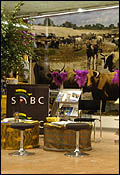It was a global marketplace in the Palexpo, especially in Hall 4, ICT for development, where South Africa had created a great safari environment, with Radio Lora streaming from a cabin. But even in Hall 1, with the media centre and government and company stalls, there was a quite exotic feel to everything. Blond Swiss ladies dressed like Mauritanian women, with posters calling for a closure of the digital gap, a cyberpuzzle from ARS ELECTRONICA offering you a chance to reconfigure your face and a speakersí corner of the International Federation of Journalists.
However, one of the first shocks I got was when I (wearing a press accreditation) discovered that you could walk DOWN the stairs to Hall 4, but not UP the stairs to the realm of media, government and private companies. No way, you had to walk all the way back to the entrance hall, go once again through the security check, to go back to your workplace: the media centre. Losing 20 minutes of valuable time and peace of mindÖ
Now the media have been a contentious issue of WSIS. Under pressure from China, Egypt and Mexico the Final Declaration threatened to make freedom of the press subject to limitation by national laws. In other words: freedom for governments to oppress the press.
On the other hand a lot of mainly African developing countries had put their hopes on the establishment of a Digital Solidarity Fund, to bridge the digital divide.
In the end it was a kind of trade off: the clause that permitted censorship on a national scale was left out, and the Digital Solidarity Fund was put on a low fire.
No failure
South African Media expert Tracey Naughton was moderately content: "I am of the view that the WSIS Declaration of Principles is not as visionary as it ought to have been but that this cannot be equated to failure." In fact, one cannot expect more. "It is at least not as regressive as we thought it would shape up to be at the end our preparation. Given the disparate views that range from totalitarian approaches of nations like China and Mexico to the US thinly disguised regressive and sly withdrawal from the freedom of expression they espoused to the rest of the world."
No doubt the effort to make a concerted stand in Geneva has cemented co-operation between colleagues, and raised awareness of the issues at stake, both challenges and threats.
Right to talk back
 |
|
The Right to communicate is a more fundamental and more clearly defined demand than freedom of expression, or freedom of the press. Freedom can mean anything these days of anti-terrorism and security.
But the right to communicate is just this: the right to send and receive messages, with all possible means. So please remember: media are just one form of communication, and mostly only down to the listeners/readers/viewers. Walking up and down a staircase, without being pushed back by a deaf and dumb security person, is another one.
The right to talk back, which is now within reach thanks to ICTs, cannot be denied to any human being. But this is still beyond the capacity of the delegates to grapple with, Iím afraid.
Impression
HIGHwayAfrica is, "a vibrant and growing network of African journalists empowered to advance democracy and development through their understanding and use of appropriate technologies". This Highway staged a news agency that produced daily articles from the summit.
Hereís a handful of headers:
- A new media study launched today at the World Summit on the Information Society (WSIS) shows that little or no media attention is given to issues related to the information society and ICTs by mainstream media in Africa
- Zimbabwean President, Robert Mugabe, has accused "the rich imperialist northern countries" of using ICTs as tools of espionage and propaganda
- Funding for information technologies in the least developed countries has proved to be the most difficult obstacle to overcome in the negotiations leading up to the World Summit on the Information Society
- Following intense lobbying by media and civil society groups, the declaration to be presented to the World Summit on the Information Society (WSIS) has included more progressive clauses on freedom of expression and the role of the media in the information society.
- Disappointed that initial promises of equal partnerships between governments and civil societies in the WSIS processes have been empty ones, over 300 civil society organizations gathered in Geneva have decided to come up with their own separate Civil Society Declaration to WSIS.
- World leaders have agreed to set up a workforce early next year to come up with a framework to build the Digital Solidarity Fund (DSF), to be created to finance projects to bridge the digital divide between South and North.
Jo van der Spek is an Amsterdam-based freelance journalist and radio maker, specialized in tactical media in crisis areas
www.radioreedflute.net

